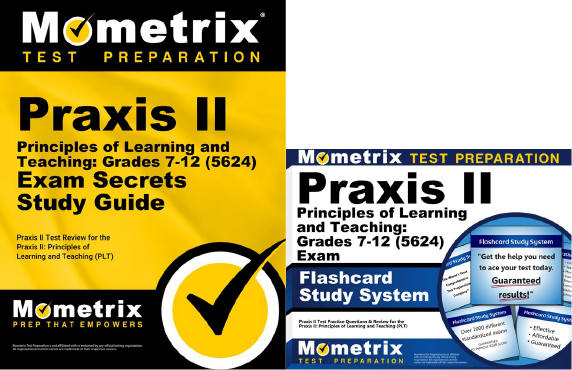If you need help studying for the Praxis Principles of Learning and Teaching: Grades 7-12 test or just want some more information about what the test is like, you’ve come to the right place!
Click below to take a free Praxis PLT: Grades 7-12 practice test!
What’s on the Exam?
First, let’s talk about the questions on the Praxis PLT: Grades 7-12 test. There are 74 questions in total, most being selected-response and some being constructed-response.
70 questions
Selected-response questions require you to select the correct answer from a list of options. Multiple-choice questions are the most common example, but you may also see true-or-false questions and “matching” questions, which ask you to match terms or concepts with their definitions.
Constructed-Response (CR)
4 questions
The constructed-response questions require you to write your answer instead of selecting from a list of choices. Your response to these questions is generally expected to be at least a few sentences, but you’ll be given specific details and instructions before you take the test.
The time limit for the test is 2 hours. There aren’t any scheduled breaks, but you’re free to take restroom breaks as needed!
Let’s take a closer look at the different sections of the test:
1. Students as Learners
21 questions
- The theoretical foundations of student learning
- Major contributions of major theorists to education
- Concepts and terms pertaining to learning theories
- The characteristics of the stages of human development
- Variables that affect student learning and performance
- Recognizing areas of exceptionality
- Legislation relating to students with exceptionalities
- Traits, behaviors, and needs of intellectually gifted students
- The effect of English language acquisition on the educational experience of English learners
- Accommodating students with exceptionalities
- The implications of foundational motivation theories for instruction, learning and classroom management
- Classroom management strategies
- Helping students develop self-motivation
2. Instructional Process
21 questions
- The role of standards and frameworks in instructional planning
- Applying the basic concepts of predominant educational theories
- The effect of scope and sequence on instructional planning
- Selecting content to achieve objectives
- Identifying various resources for planning enrichment and remediation
- The role of materials and resources in supporting learning
- The cognitive processes associated with learning
- Features of different instructional models
- Strategies for encouraging complex cognitive processes
- Basic strategies for promoting development of self-regulatory skills
- Different grouping techniques and strategies
- Monitoring and adjusting instruction
- Different types of memory
- The components of effective questioning
- Supporting students in articulating their ideas
- Encouraging higher level of thinking
- Verbal and nonverbal communication modes
- The effect gender and culture can have on communication
- Effective listening strategies
3. Assessment
14 questions
- The roles of formal and informal assessments
- Creating and selecting appropriate assessment formats
- Evaluating students’ performance
- The rationale behind students’ self and peer assessment
- Types and purposes of standardizes tests
- Norm-referenced and criterion-referenced scoring
- Holistic vs. analytical scoring
- Interpreting assessment results
4. Professional Development, Leadership, and Community
14 questions
- Various professional development practices and resources
- The implications of research, views, ideas, and debates on teaching
- The role of reflective practice for professional growth
- The role of teachers and schools within the greater community
- Developing collaborative relationships
- The implications of major legislation and court decisions relating to students and teachers
5. Analysis of Instructional Scenarios
4 questions
The questions are categorized as follows:
- Students as learners (1-2 questions)
- Instructional process (1-2 questions)
- Assessment (0-1 questions)
- Professional development, leadership, and community (0-1 questions)
How to Register
To register for the test, you’ll need to create an account on the ETS website. Once your account has been created, you can submit your application to take the test.
When you submit your registration, you will need to pay the $156 testing fee.
Praxis Scores
The Praxis PLT: Grades 7-12 test is scored using a scaled scoring method. Here’s how it works:
For every question you answer correctly, you get one point added to your raw score. At the end of the test, your final raw score will be converted to a scaled score. This scaled score will range somewhere between 100 and 200.
The reason your raw score is converted to a scaled score is because everyone that takes the test is given a slightly different set of questions. Since everyone has a different arrangement of questions, and because some questions are harder than others, converting your raw score to a scaled score ensures a more even playing field.
FAQs
How many questions are on the Praxis PLT: Grades 7-12 exam?
The exam contains 74 questions.
What is the time limit for the Praxis PLT: Grades 7-12 exam?
The exam is timed at 2 hours.
What is the passing score for the Praxis PLT: Grades 7-12 exam?
You’ll need to get a final scaled score of at least 157 in most states.
How much does the Praxis PLT: Grades 7-12 exam cost?
The testing fee is $156.



 Praxis Study Guide
Praxis Study Guide Praxis Flashcards
Praxis Flashcards